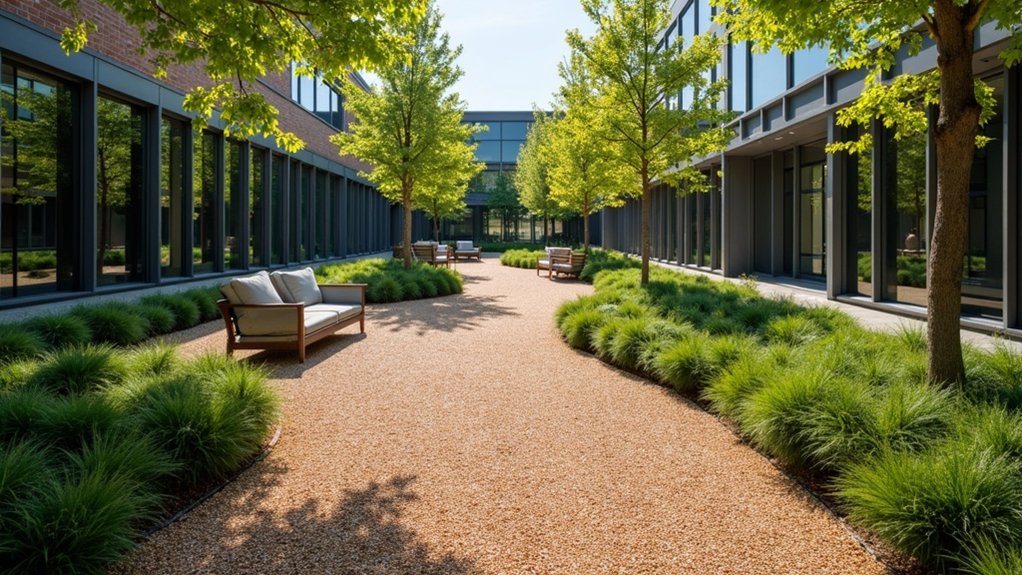Choosing resin-bound gravel for office complexes demands careful planning to suit British weather and usage patterns. Select aggregate colours and textures that complement your corporate image whilst ensuring a practical, non-slip surface for our often-wet climate. The finish must be sturdy enough to withstand heavy foot traffic and occasional vehicle use, much like the successful installations at major business parks in Manchester and Birmingham.
Make certain the surface transitions smoothly between different areas – think gentle slopes rather than abrupt changes. For proper drainage, essential in the UK’s rainy conditions, opt for permeable solutions that meet SUDS (Sustainable Urban Drainage Systems) requirements.
Regular maintenance keeps the surface looking smart and prevents costly repairs – a twice-yearly deep clean typically suffices for most installations. Factor in accessibility for all users, including wheelchair access and clearly marked pathways, particularly important for meeting British building regulations.
Key Takeaways
Keep colours in line with your building’s brand and local architecture – think sleek greys for modern buildings or warmer tones for traditional offices.
Add texture to prevent slips – particularly important near entrances and high-traffic areas where people rush during peak hours.
Create smooth, gap-free paths that work for everyone, from wheelchair users to those pushing delivery trolleys.
Sort proper drainage from the start – British weather demands it. Slope surfaces slightly and install drainage channels where needed.
Clean and check regularly – a quick monthly inspection and power wash twice yearly keeps your surface looking smart and lasting longer.
Understanding the Benefits of Resin-Bound Gravel
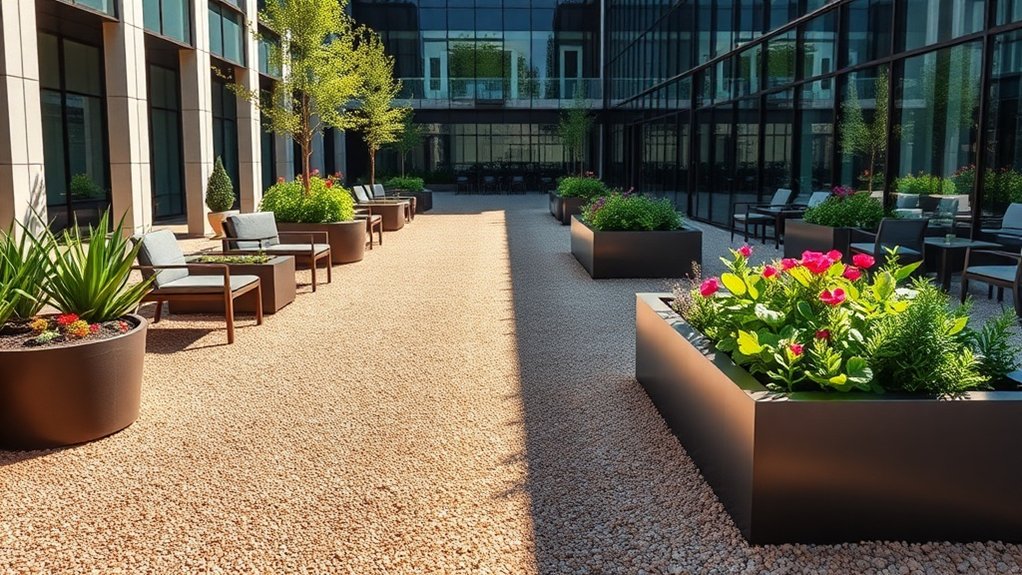
Resin-bound gravel offers more than just good looks for your outdoor space – it’s a practical choice that stands up brilliantly to both foot traffic and vehicles. The resin creates an incredibly tough surface that won’t crack or wear down like traditional paving, meaning you’ll spend less time and money on repairs. Think of it as laying a protective shield over your driveway or garden path. The gravelled surface provides excellent grip, which is particularly valuable during Britain’s wet weather and winter months. Unlike smooth surfaces that can become treacherous when wet, resin-bound gravel stays reliably slip-resistant. Additionally, its permeable and sustainable design allows rainwater to drain away naturally, helping prevent those annoying puddles that plague concrete and tarmac surfaces. This not only enhances safety but also complies with UK sustainable drainage regulations (SuDS), making it an eco-friendly option. Maintenance couldn’t be simpler – a quick sweep and occasional power wash is all it needs. Whether it’s for your home driveway or business entrance, resin-bound gravel delivers a smart, durable finish that’s both practical and visually appealing.
Choosing the Right Aggregate Colors and Textures
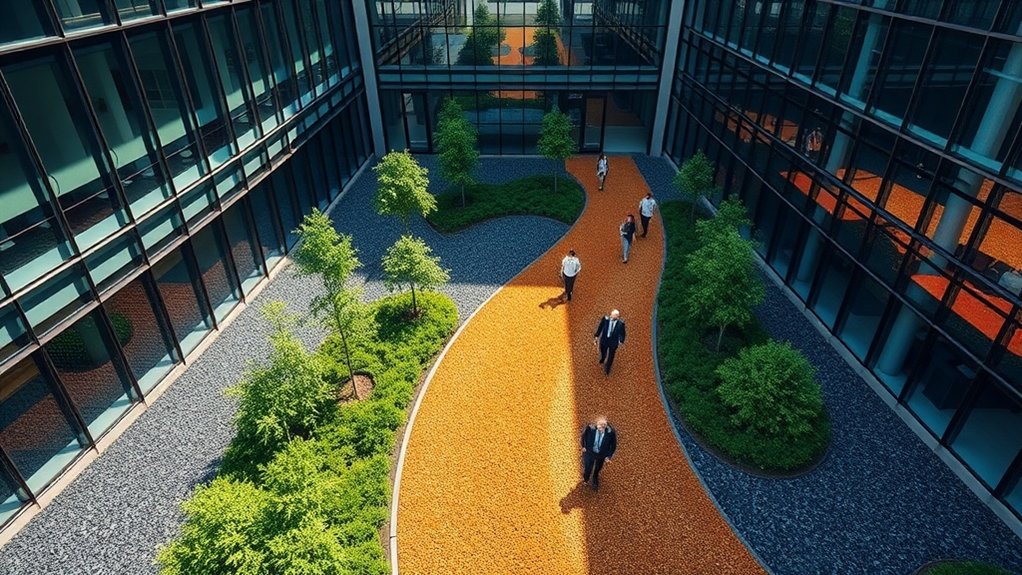
Choosing suitable aggregate colours and textures for resin-bound gravel doesn’t need to be complex. Neutral tones work brilliantly for professional settings, like office car parks, whilst vibrant shades effectively mark out pedestrian zones or disabled bays. The texture needs to balance both practical grip and visual appeal. Additionally, selecting aggregates with UV-resistant properties ensures that the surface remains visually appealing despite the effects of the British weather. Many popular shades can enhance the aesthetic while ensuring durability.
Quick reference for common uses:
| Colour Choice | Texture Type | Purpose |
|---|---|---|
| Neutral Greys | Fine | Blends with existing paving |
| Bold Reds | Coarse | High-visibility marking |
| Earthy Greens | Mixed | Gardens and parks |
UV-resistant aggregates are essential for British weather – they’ll keep their colour despite our varied climate. The right mix should complement your property whilst handling daily foot traffic and weather conditions.
Remember: samples viewed outdoors in natural light give the most accurate preview of the finished result.
Planning for Slip Resistance and Safety
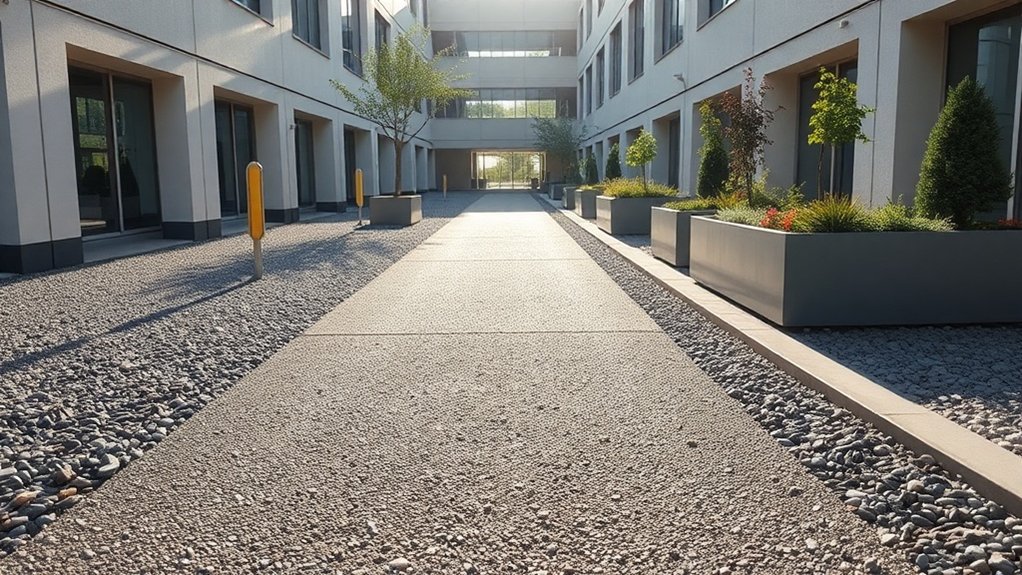
Slip-resistant and safe resin-bound gravel surfaces offer natural grip through their textured finish. The material’s permeability handles British weather well, allowing rainwater to drain away rather than creating puddles. These practical safety features make it particularly suitable for driveways, paths and public spaces across the UK, whilst maintaining a smart appearance. Additionally, this type of paving is designed to reduce slippage risk in high foot traffic areas, ensuring safety for both customers and employees. Proper installation standards and anti-slip additives can further enhance the surface’s grip and long-term durability.
Natural Texture Benefits
Natural Textures in Resin-Bound Gravel
Natural stone textures create essential grip and safety features in resin-bound surfaces. The combination of natural aggregates delivers both practical safety benefits and kerb appeal.
Key advantages include:
- Better grip: Textured surfaces reduce slipping, particularly in Britain’s wet weather
- Flexible design: Different stone sizes offer varying levels of grip, perfect for busy walkways
- Level surface: No joints or gaps to catch heels or walking sticks, making paths safer for all users
These natural textures work brilliantly in commercial settings, from office car parks to shopping centres, delivering both safety and style in equal measure.
Permeable Surface Advantages
Resin-bound gravel offers a practical solution to common surface drainage problems whilst providing excellent grip in all weather conditions. The material’s porous nature allows rainwater to seep through naturally, preventing puddles and helping manage flood risk.
Unlike traditional loose gravel, the bound surface eliminates loose stones and trip hazards, making it particularly suitable for busy areas such as car parks and walkways.
The surface maintains its non-slip properties even during wet British winters, thanks to carefully selected aggregates mixed into the resin. This proves especially valuable around building entrances and pedestrian areas where slip hazards typically increase during rainy weather.
With minimal upkeep required and impressive longevity, resin-bound surfaces offer a sensible choice for property managers looking to balance safety compliance with practical maintenance.
Ensuring Durability and Longevity of Surfaces
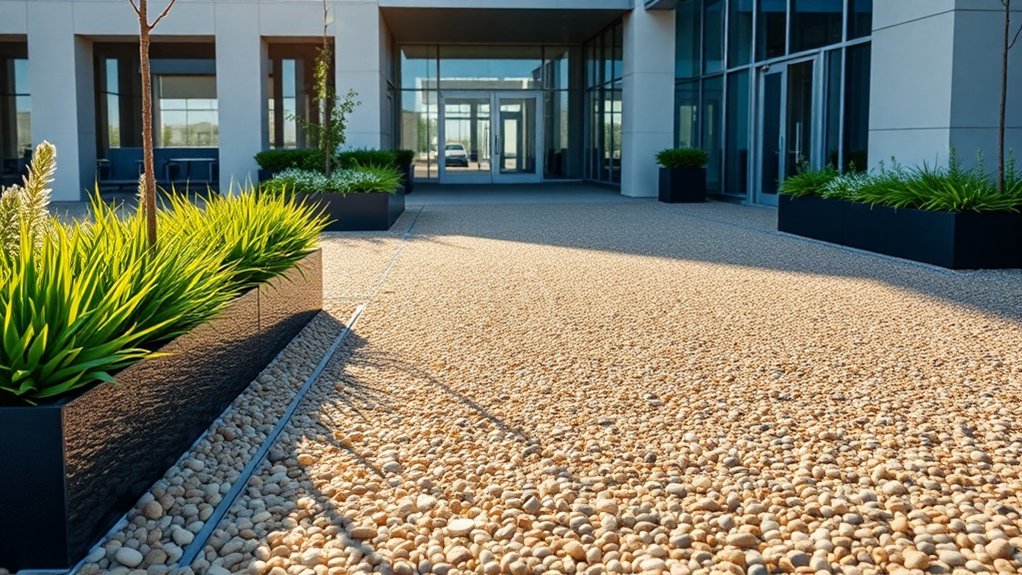
For Long-Lasting Resin-Bound Gravel Surfaces
Essential steps for a durable finish:
- Choose UV-stable resin that won’t yellow over time (much like a quality garden fence paint)
- Sort proper drainage first – a well-prepped sub-base prevents winter frost damage
- Invest in quality aggregates that won’t crumble under daily wear and tear
Think of it as building a solid foundation for your home – get these basics right, and your surface will serve you well for years to come.
Maintenance Strategies for Resin-Bound Gravel
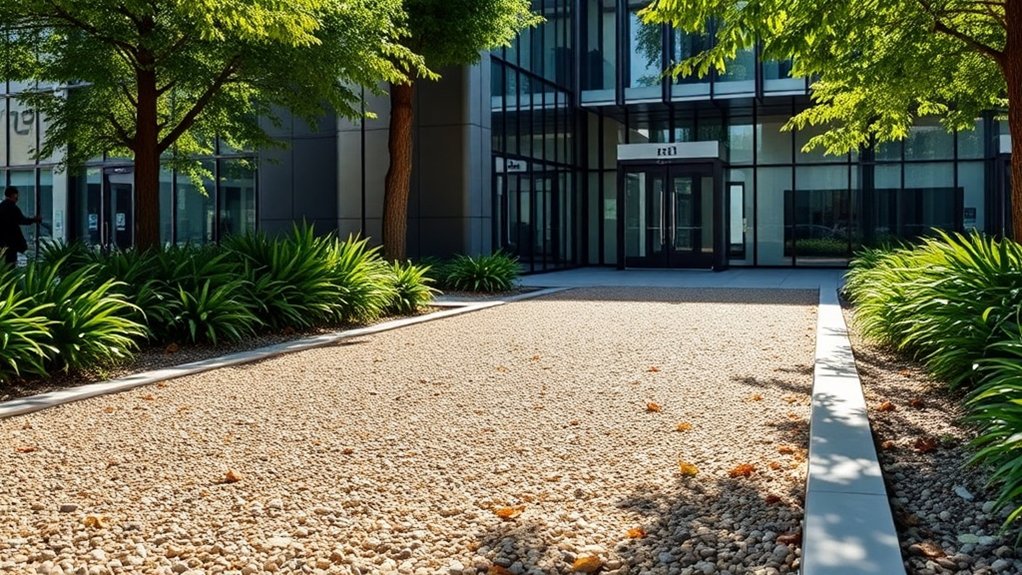
Regular cleaning and proper care keep resin-bound gravel in top condition.
Sweep leaves and debris weekly with a stiff brush, and wash the surface monthly using a garden hose or pressure washer on a low setting.
For stubborn marks, use a mild soap solution – the sort you’d use on your patio.
Avoid harsh chemicals or metal tools that might scratch the surface.
Tackling small issues promptly, like oil spills or moss growth, prevents long-term damage and maintains the driveway’s smart appearance.
Routine Cleaning Practices
Keeping Resin-Bound Gravel Clean
Regular cleaning keeps resin-bound driveways and paths looking sharp whilst protecting your investment. Essential cleaning tasks include:
Debris Removal
Brush or leaf-blow surfaces weekly to prevent blocked drainage and maintain that smart appearance.
Washing
Use a standard garden hose or pressure washer on low setting. Keep the nozzle 30cm from the surface – too close risks damage.
Cleaning Products
Stick to pH-neutral cleaners from your local DIY shop. Harsh chemicals can break down the resin, so gentle solutions work best.
Following these simple steps should keep your surface looking fresh and working properly all year round.
Damage Prevention Techniques
Regular care of your resin-bound gravel surfaces is vital to prevent damage and avoid costly repairs. Check your surfaces every 3-6 months for signs of wear, particularly looking for cracks or colour changes.
It’s much like spotting a chip in your car’s windscreen – catching issues early means simpler fixes.
To protect your surface:
- Keep heavy items off the surface (think garden furniture or parked vehicles)
- Use protective mats in busy areas, like near doorways
- Keep drains clear to stop water pooling
- Clean up spills straight away using absorbent materials
- Use neutral cleaning products rather than harsh chemicals
For repairs, match your repair materials to the original surface – much like matching paint on a wall touch-up.
Quality repair kits from your local DIY shop will do the job nicely. Proper maintenance might seem fussy, but it’s far cheaper than replacing the whole surface.
Enhancing Aesthetic Appeal in Office Design
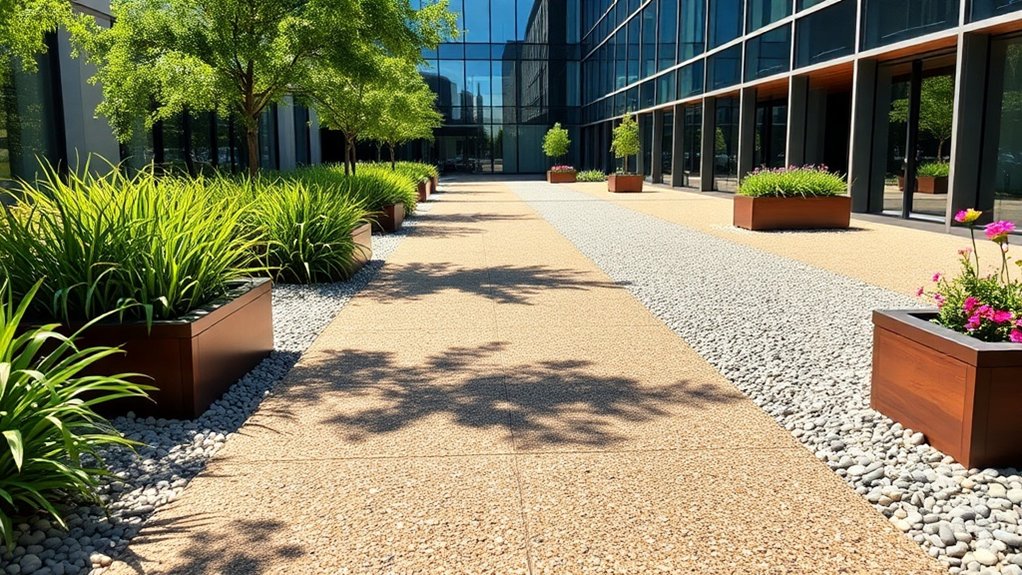
Enhancing Office Design with Resin-Bound Gravel
Resin-bound gravel offers a smart way to transform your office aesthetics whilst maintaining practicality. The material proves particularly effective for British weather conditions and suits both modern and traditional business settings.
- Colour Options: Match your company colours or create subtle tones that complement local architecture – from Yorkshire stone hues to contemporary greys
- Bespoke Patterns: Add company logos or wayfinding markers directly into walkways and reception areas
- Unified Design: Blend pathways seamlessly with existing buildings and gardens for a professional finish
The system works brilliantly for British commercial spaces, combining visual appeal with proper drainage – essential for our rainy climate.
It’s a durable choice that maintains its looks throughout the seasons.
Environmental Considerations and Sustainability
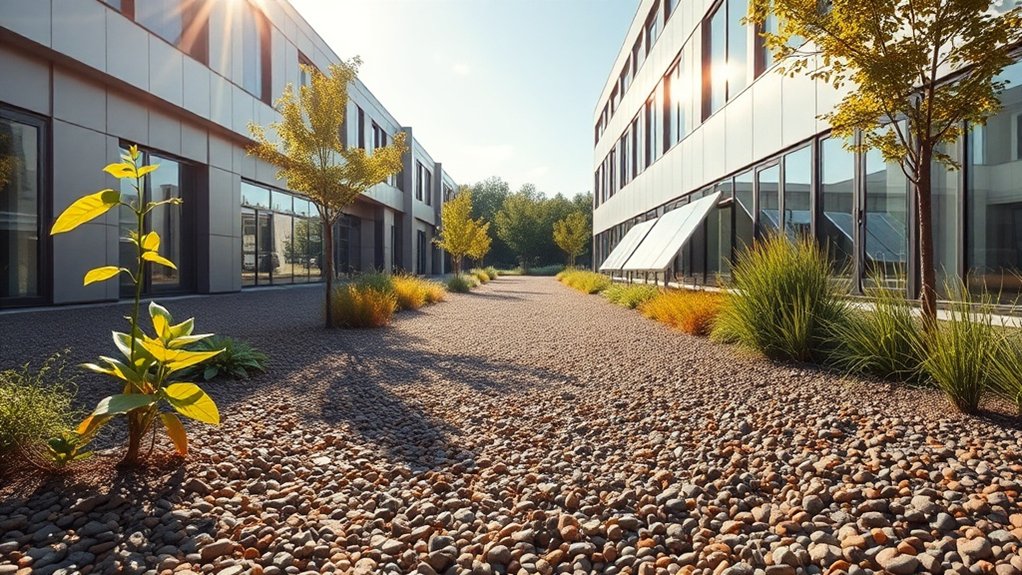
Resin-bound gravel offers more than just kerb appeal – it’s a sustainable drainage solution that helps manage Britain’s notorious rainfall.
The permeable surface lets rainwater filter naturally into the ground, cutting flood risks and supporting local wildlife.
Using locally sourced materials makes this an environmentally sound choice for UK driveways and paths, particularly in areas prone to surface water issues.
Stormwater Management Solutions
Stormwater Management Solutions
Growing UK cities need smart drainage solutions to prevent flooding and protect our environment.
Resin-bound gravel offers a practical answer for office developments, bringing several key benefits:
- Permeability: The surface soaks up rainfall at 850-1,000 litres per square metre per hour – roughly the equivalent of a month’s worth of typical British rainfall in a single hour.
- Pollution Filtration: Works like a natural water filter, catching harmful substances before they seep into groundwater. Think of it as a giant Brita filter for your car park.
- Maintenance Efficiency: Unlike traditional concrete or tarmac, resin-bound gravel needs minimal upkeep.
Less maintenance means fewer repair vehicles on site and reduced waste – a win for both facilities managers and the environment.
Sustainable Material Sourcing
Sustainable Material Sourcing for Resin Driveways
Choosing sustainable materials for resin-bound gravel requires careful balance between environmental impact and performance. Select low-VOC, solvent-free polyurethane resins to boost durability whilst reducing environmental harm. Source aggregates locally or use recycled options to cut transport emissions and support green practices.
| Material Type | Environmental Benefit | Certification |
|---|---|---|
| Polyurethane Resin | Lower VOC emissions | BBA, FeRFA |
| Recycled Aggregates | Reduced demand for virgin materials | LEED compliance |
| UV-Stable Resins | Improved durability | Material certification |
| Local Stone Aggregates | Minimised transportation emissions | Sustainable sourcing |
| Permeable Materials | Supports groundwater recharge | Environmental standards |
These sustainable choices reduce maintenance costs and waste, making them practical for UK homeowners and contractors. For example, locally sourced Cotswold stone offers both environmental benefits and traditional British aesthetic appeal.
Urban Ecosystem Support
Sustainable materials enhance resin-bound gravel‘s longevity whilst supporting local urban ecosystems.
These surfaces create vital green corridors across office developments, offering real environmental benefits:
- Natural drainage: The permeable surface manages rainwater effectively, reducing flood risk and water pollution
- Wildlife-friendly spaces: Provides essential habitats for urban wildlife, from insects to small birds
- Temperature control: Light-coloured stones reflect heat, cooling the surrounding area and supporting local plants and animals
Resin-bound gravel transforms office exteriors whilst actively supporting the local environment.
It’s a practical choice that delivers both visual appeal and genuine ecological value.
Functional Applications in Office Complexes
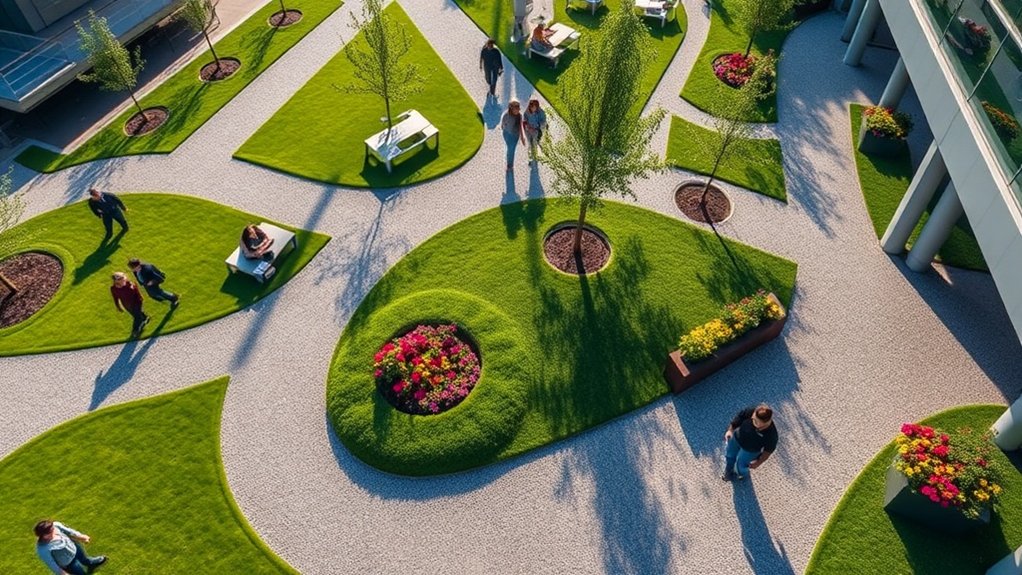
Resin-bound gravel proves ideal for office complexes, offering exceptional durability in busy areas. The material easily withstands constant foot traffic and vehicle movement, whilst maintaining its structure and supporting smooth circulation.
Its permeable nature works brilliantly with UK drainage systems, helping manage our notorious rainfall and reduce flooding. The non-slip surface keeps staff and visitors safe, particularly during wet weather – a common concern for British properties.
The range of colours and finishes available means it blends seamlessly with modern or traditional office buildings, creating smart-looking walkways and outdoor spaces. For UK office managers, resin-bound gravel represents a practical, long-lasting solution that needs minimal upkeep and delivers both function and style.
Accessibility Features for Pedestrians and Vehicles
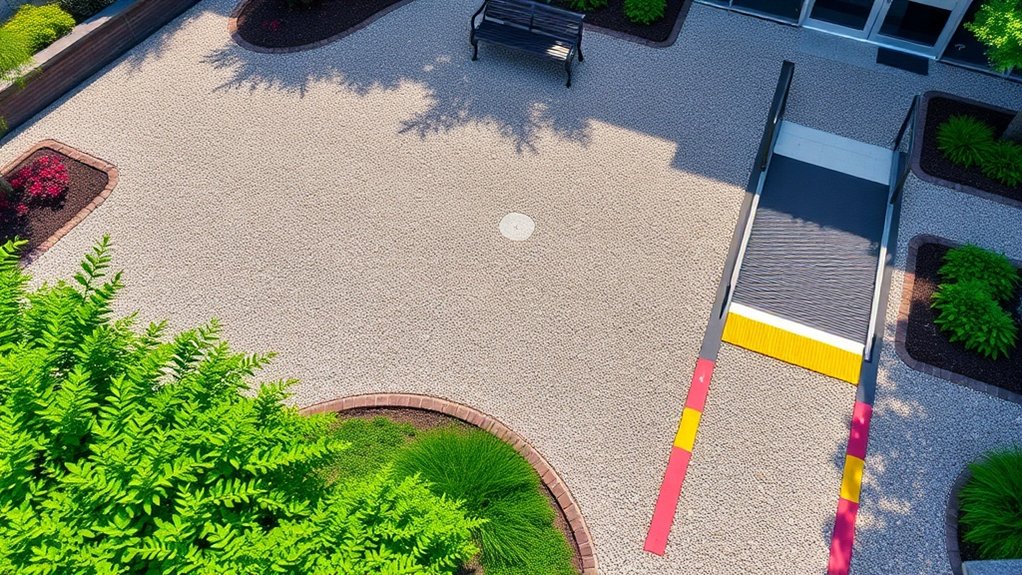
Planning Accessible Paths for Pedestrians and Vehicles
Resin-bound gravel pathways need proper accessibility features to ensure safe use by everyone.
Essential requirements include:
- Smooth surface transitions with no sudden level changes above 6mm to allow easy wheelchair movement
- Gaps and openings no wider than 13mm to stop wheels getting stuck
- Proper drainage to prevent slippery surfaces, especially during British weather
These basic standards help create paths that work well for all users, from parents with pushchairs to elderly pedestrians and wheelchair users.
The right design makes daily movement safer and more practical for your whole community.
Customizing Designs to Match Corporate Branding
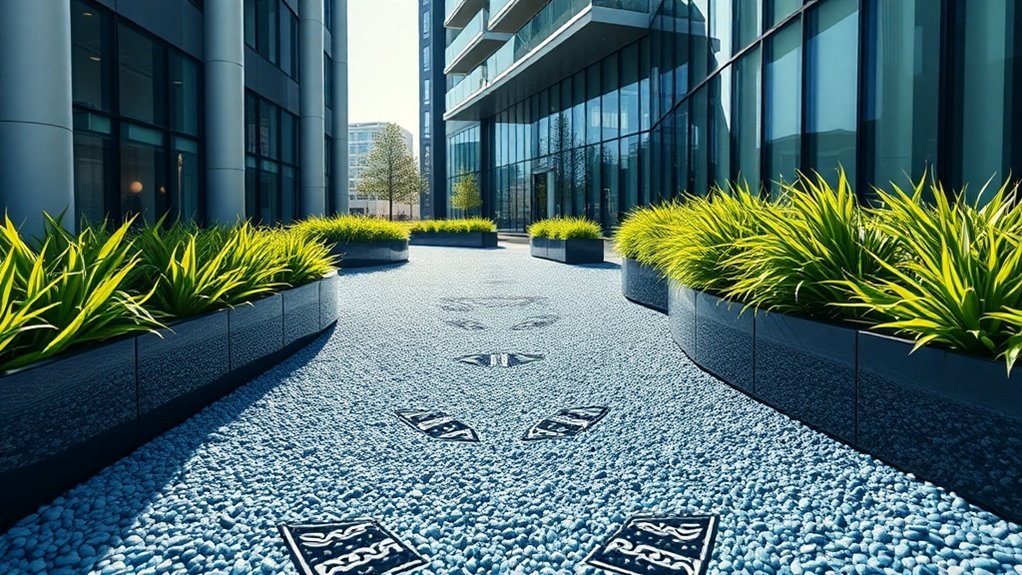
Customising resin-bound gravel to match your company’s branding creates a striking first impression whilst maintaining practical outdoor spaces.
Choose from countless colours and stones that complement your corporate colours – from classic granite to contemporary recycled glass.
Your company logo can be seamlessly incorporated into the surface design, creating eye-catching features at entrances or gathering spots.
Smart pattern choices, like curved pathways or geometric shapes, can mirror your brand’s personality.
Best of all, resin-bound surfaces keep their looks for years, meaning your branded outdoor space stays sharp and professional without constant upkeep.
It’s particularly effective for office car parks, walkways and reception areas where brand visibility matters most.
Managing Stormwater Effectively With Permeable Surfaces
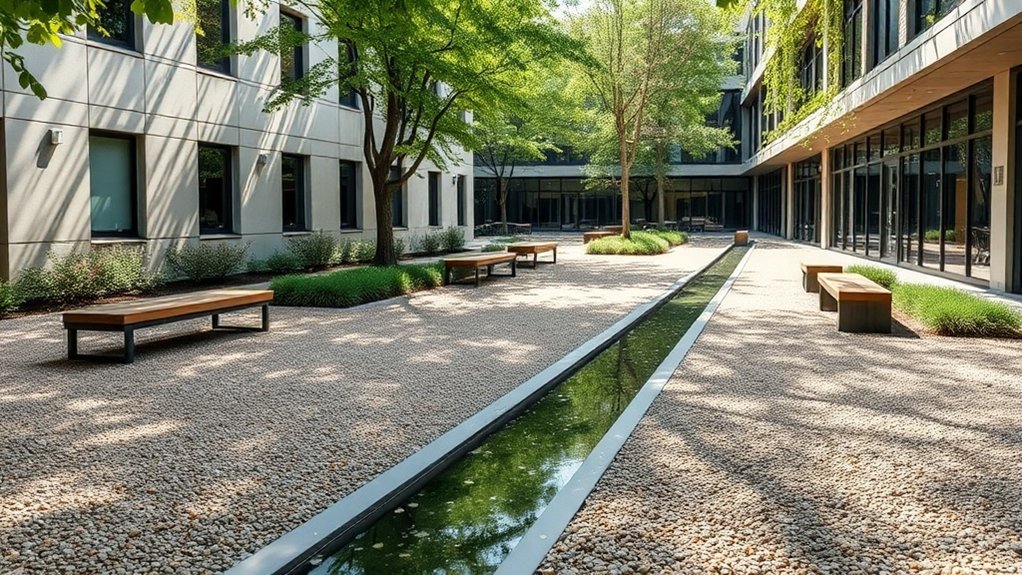
Sensible Stormwater Solutions Using Permeable Surfaces
Proper stormwater management relies heavily on permeable surfaces such as resin-bound gravel, allowing rainwater to soak into the ground naturally rather than flood surrounding areas.
These surfaces prove particularly valuable for British weather conditions, helping tackle both heavy rainfall and urban flooding issues.
Key advantages:
- Water Management: Resin-bound gravel reduces surface water by up to 100%, much like a garden lawn would naturally absorb rainfall.
- Clean Water Benefits: The gravel layers filter out dirt and pollutants, similar to how a coffee filter works, ensuring cleaner water reaches the ground below.
- Year-round Performance: These surfaces work effectively in all British weather conditions, from summer downpours to winter sleet and snow.
Using permeable surfaces is particularly relevant for driveways, car parks and garden paths, where traditional concrete or tarmac would typically cause water to pool or run off into already-strained drainage systems.
Implementing Seamless Installations for Safety and Functionality
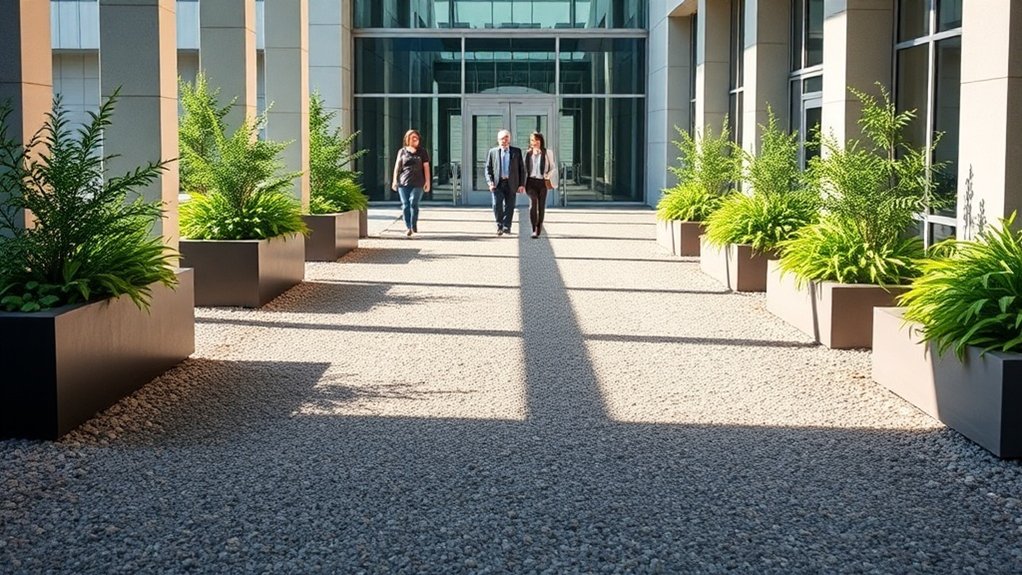
A successful resin-bound gravel installation demands careful planning for both safety and practicality.
First, properly prepare the surface by thoroughly cleaning the substrate and fixing any uneven spots. For proper drainage, create a slight slope between 1:12 and 1:40 – think of a gentle ramp rather than a steep hill. This prevents water from collecting in puddles.
Work in smaller sections, particularly on slopes, to keep proper control of the resin mixture. Use a power float to achieve an even finish, and regularly check the surface is level. Mix in anti-slip stones to boost grip, particularly important for meeting British accessibility requirements.
For office settings, this attention to detail makes the difference between a dodgy surface that causes problems and one that serves its purpose properly.
Think of it like laying carpet – rushing the job leads to bubbles and trips, whilst taking time ensures a professional finish that lasts.
Frequently Asked Questions
How Does Weather Affect the Installation Process of Resin-Bound Gravel?
Weather plays a crucial role in resin-bound gravel installation. Cold temperatures below 5°C slow down curing, whilst intense summer heat above 30°C can cause the resin to set too quickly. For best results, install on a dry day with temperatures between 5-25°C – typical British spring or autumn conditions are ideal. Rain is a major problem, as moisture affects bonding and can leave unsightly marks in the finished surface.
Can Resin-Bound Gravel Be Installed Over Existing Surfaces?
Resin-bound gravel works brilliantly over most existing surfaces, much like laying a new carpet over old floorboards. Simply ensure your surface is clean, stable and free from cracks – rather like prepping a wall before painting. For the best results, fix any damage and thoroughly clean the area before installation. A proper foundation means your new surface will last for years to come.
What Is the Cost Comparison With Other Surfacing Materials?
Resin-bound gravel sits at a higher upfront cost than loose gravel or basic concrete, typically around £50-£75 per square metre fitted. Whilst this initial outlay exceeds traditional surfaces, the minimal upkeep costs and 15-20 year lifespan make it cost-effective long-term. Unlike block paving that needs regular re-sanding or concrete that may crack and need replacing, resin-bound surfaces require just basic cleaning to maintain their appearance.
How Long Does the Installation Process Typically Take?
Installation typically takes 3-7 days, varying with the size and complexity of your project. Proper planning ensures we’ll prepare your surface correctly, mix the resin accurately and lay the gravel with care – all vital steps for a long-lasting finish.
Are There Any Specific Tools Needed for DIY Installation?
Essential tools for resin-bound installation include a forced action paddle mixer, steel trowels, spirit level and measuring tape. For proper mixing and application, you’ll also need a drill mixer, protective gear and finishing tools like a spike roller. Keep these tools clean throughout the process, particularly when working with resin.
Conclusion
Resin-bound gravel offers a practical and stylish surfacing solution for office complexes. The material combines a professional appearance with essential functionality, making it ideal for UK business settings. Think of it as traditional gravel but with added stability – perfect for walkways, car parks and entrance areas. When properly installed, it helps manage British weather challenges through excellent drainage whilst providing safe, accessible surfaces for staff and visitors. The system’s durability makes it a sound investment for commercial properties, and its neat finish complements modern office architecture.
